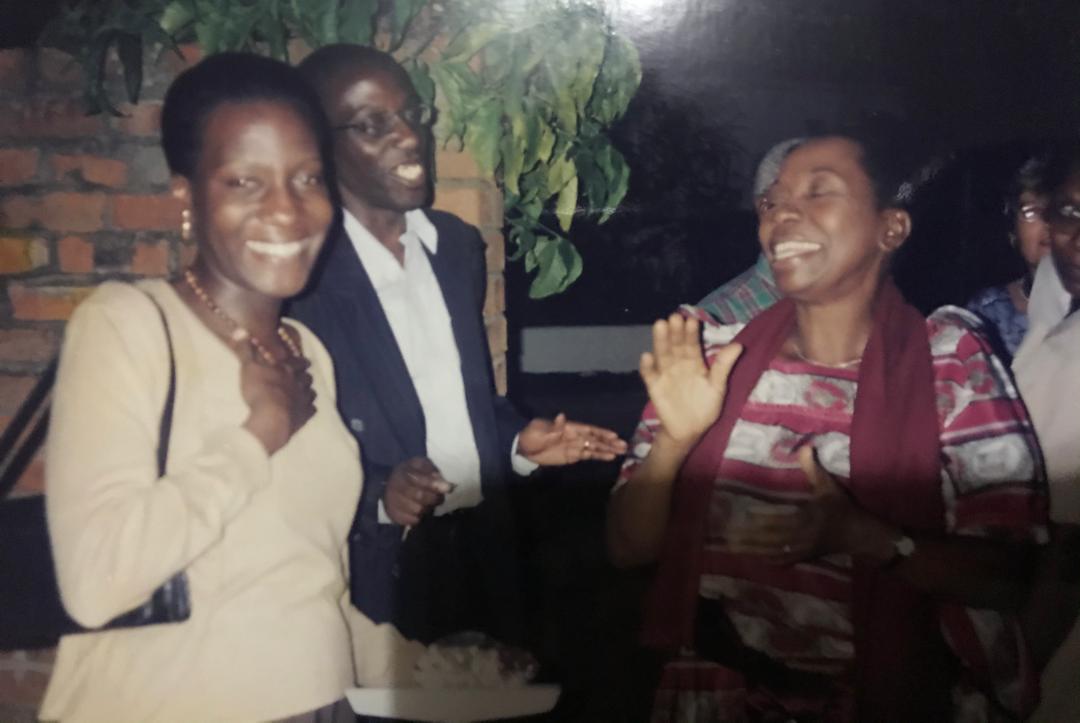As the Luwero Triangle war took root in the mid-1980s in Uganda, the country was on the brink of being a failed state, and Mrs Joyce Agiri Natabi Kaddu, found herself at its epicenter. She was the Principal of Lady Irene Teacher Training College, Ndejje, Luweero District at that time and this all girls college was surrounded by terrorists, who habitually left mines in the roadway, disrupting movement of school supplies and personnel. Internal displacement of citizens was rife and an internally displaced peoples (IDP) camp had already been set up in the college vicinity. Joyce was faced with the daunting task of keeping her students safe in the midst of incredible danger. So early one day Joyce and her staff were forced to flee for their lives and they led students and walked to Kampala, 43 Km away. With her husband, Sylvester, they looked after at least 100 students for weeks in their home at Mutundwe since many couldn’t be reunited with their families right way. The Kaddu family home at Mutundwe was transformed into one big internally displaced students camp overnight!
To find words to characterize Joyce one may think of selflessness but also a certain charitable grace. When I called up Mrs Rhoda Kalema soon after service at Namirembe, to share how she remembered her, her description of her was – “a heroic woman” ( oyo abadde mu’kazi muzira!)
For over a decade while Joyce served as Vice Chair of the Public Service Commission I would meet with her on a weekly basis for an early morning prayer breakfast event. This is how I got to know her exceedingly well and she became an adoptive mother, though at best she was my dear friend. Many a time she traveled from the Kaddu Country Home in Luyobyo – Luweero District and she was unfailing as the first to appear at Fairway Hotel, at Nakasero for those prayers. Dressed immaculately in her signature Busuuti, she was a fixture of grace.
Heroism defined Joyce all through her life. Born in August 1939, to an enterprising coffee farmer – Samwiri Merekizadeki Kasule, Joyce was blessed with a far seeing father who believed in girls’ education. When western education arrived here the Baganda as a patrilineal society reserved it largely for boys. The path of a girl was early marriage. But her father and her mother Alice Nabatanzi thought differently; they took and placed her in a girls only boarding primary school- Nalinya Lwantale, Ndejje. There she met some of her best friends in life including Mrs Robina Kalega and Mrs Christine Nassolo Kityo (RIP).
This was no mean undertaking, for it would raise eyebrows among neighbours, dismissing it as a fad and waste of money. In fact, many didnt think Joyce would last before dropping out. But not only would she complete Nalinya Lwantale, against odds, she then moved up to Gayaza High School. Joyce’s father would ride her on a bicycle from Ndejje to Kampala where he would hire a special taxi to take her to Gayaza High School. He would lead her by the hand determined that his girl would get the best education available.
At Gayaza Joyce started out with lifelong friends Rhoda Kayanja( later Mrs Nsimbabi RIP) and the vivacious Lydia Lubwama ( later Mrs Mugambi), Mrs Ida Wanendeya, Ms Robina Kawungu, Mrs Rose Kitaka, Freda Kase ( RIP) ( later Mrs Luganda) and others. These bright and self confident girls would go on to storm Makerere University where women were a rarity, at the time. You can imagine how they were intensely competed for during dance balls! They stayed in the only girls hostel then- Mary Stuart hall. One of their male school mates would go on to become President of Tanzania- HE Ben Mkapa ( RIP). After school they kept in touch. Once as President Ben Mkapa here on a state vist, he called up and took out Joyce and other classmates for a private dinner at Sheraton Hotel.
In 1963 Joyce graduated with a Bachelor’s degree in Economics. They were few graduates then, leave alone women, and Joyce quickly secured a job with Shell. And just as she was starting, a dashing young man newly returned from England, arrived.
On his father’s side Sylvester Kaddu her husband-to-be, was one of only two children born to Rev Samson Kiwanuka, a former Chaplain of Makerere College School and later Dean of Anglican church Diocese of Bulemezi. His only sister was Gibwa Gwokyalya ( later Mrs Kanyerezi). Sylvester’s mother, Deborah Nandawula Lebeka Mulira was from the Kooki princely ancestry; the elder sister of EMK Mulira and other famous Mulira siblings. After joining Buddo Junior School and Kings College Budo in late 40s/ early 50s, where some of his school mates included Peter Nkambo Mugerwa, Mrs Betty Senkatuka and my cousin Mangalita Kavuma ( later Mrs Sam Odaka). After he went to Makerere University and then on to London University where he majored in English and for a number of years taught English people their language!
Sylvester was a man of many gifts, with a deep baritone voice and perhaps the best English speaker around after Ssekabaka Mutesa II. It was only a matter of time before he met Joyce and the two became etwined.
On 15th December 1962, these love birds were wedded at Namirembe Cathedral and hosted their guests at Makerere University Arts quadrangle. Joyce’s matron was Eunice Lubega Posnansky (RIP) while Sylvester’s best man was his first cousin Erisa Kironde (RIP). They were deeply committed to each other as a couple and greeted each other as “Darling!” Fifty years later together with all the children around we met at the same wedding venue to celebrate what was a happy most productive union.
If there was a couple that was agreed on one thing this couple was decided on raising a big family. First had come Deborah (Debbie), quickly followed by Samson, Samuel (RIP), Mark, Micheal, Brenda ( Nina) and then finally Peter.
The 1970s were not a very easy time to raise a family of a nearly dozen children- families those days would open the door to extended family and both came from big families. Following Idi Amin’s Economic war the “magendo” economy wiped out much of salaried income due to galloping inflation. To survive most salary earning families had to find a “side hassle” and for the Kaddus it meant starting and running a restaurant, among others. At some point Joyce also decided to switch career and join the more stable teaching fraternity. Joyce would go on to teach at Aggrey Memorial School, Old Kampala Secondary School, Shimoni Teacher Training College culminating as Principal of Nalinya Lwantale, Ndejje.
In between she also found time for community work. Founded in 1902 as the first girls secondary school, she realised a need to have an umbrella alumni organisation for her alma matter. Joyce was a co founder and first Chairperson of Gayaza Old Girls Associaton. In 1977 when Uganda celebrated 100 years of Christianity Joyce was Secretary of Centenary celebrations. She went on to represent the church of Uganda at the World Council of Churches.
Here we must pause and ask ourselves where did Joyce pick her work ethic that enabled her juggle so many roles. Was it in born or it had to do with her upbringing- environment! I would argue the latter. Joyce had grown up under an enterprising coffee farmer. Any who knows about coffee cultivation, which involves hand pruning, harvesting, drying and bagging, will testify that this system would spare no lazy child who grew up under such a household. In fact children of coffee farmers so often were required to pick coffee berries themselves for their school fees. They had to get up early and work in fields late in the day. Such children came out with a work ethic that would enable them thrive in all adverse situations.
Joyce’s father loved preaching “hard work pays!” which became a life motto. Indeed it is these transferable life skills that Joyce passed on to her children. Life in her household was clockwork routine of scrubbing, washing, mopping and cooking meals. “She woke us up before dawn,” shared the children at the funeral, “and we were up on our feet doing all sorts of chores through the day!” There was hardly any work for house hold helpers, indeed she discouraged the culture of having domestic help .
For Debbie, being the eldest, she sometimes found herself preparing a meal for nearly 20 mouths as the Kaddu home was open to all. At one point she stepped back, confused if this was her “real mother” as she assigned her one task after the other!
Parents of today who have been let on to popular liberal jargons about “child abuse” may here whish to reflect on their style especially if they observe the fruits of this upbringing on her children. In latter life, all would graduate with university degrees and go on to excel in their professions.
Both Joyce and Sylvester had been raised in church and were always active, with Joyce as a strong member of Mothers Union. In the early 1970’s the late Bishop Dunstan Nsubuga started seeking out career professionals to join the “collar” as tent makers. Sylvester who had since progressed as a career civil servant was approached. The couple prayerfully considered and decided to take the leap. It was a carageous decision of faith as it meant giving up on their house tucked in Nakasero leafy suburb. Sylvester had been the first African Clerk to Parliament and rose to Parmanent Secretary of Ministry of Agriculture and Animal husbandry. But they never looked back.
I had grown up much in Joyce’s shadow. At Budo I studied with three of Kaddu boys ( famed for piano playing) who became close buddies, particularly Sam (RIP). At Makerere University I was among steady “benchers” in Debbie’s room in CCE hall, till we heard there was a certain Doctor firmly locked in, and then deflated, we all scattered. Then while living in Chicago, US, I met flight Captain Gad Gasaatura, who introduced me to the Prayer Breakfast movement. When Hon Balaki Kirya was abducted by Obote 2 regime forces in Nairobi in the 1980s and imprisoned for the second time ( he was one of the five ministers detained during Obote I regime), while locked up in Luzira prison he gave his life to Jesus as a personal Saviour. After the Museveni government took over he decided to reach out to fellow leaders with a message of salvation in Christ through prayer breakfast outreaches.
This is where I met Joyce who, of course, was a commited believer, upon return to the country. Yes, she knew me well, as her family and mine had been close, due to our common inheritance as children of Balya Nnaka- those who originate from Bulemezi. In getting to know her I found a late friend and where had I been all along!
We hit it off from go and she gently urged me to get settled with a family as fast. When I met someone it is her I had to call upon to accompany me for kwanjula. Without waste she complied and along the way as was typical of her mentored me in all the grand cultural norms.
Almost immediately after our wedding the calls started. Her request was simple but direct- “Kati muzaale abaana musirike” ( Now start having as many children as you must). She expected numbers to rival her near dozen troop. When I slowed down I knew I had to explain myself. I argued that these were days of much smaller families. “No!” She waved me off. “It is God who gives and raises children!”
As she advanced in age Joyce’s robust health started to ebb. Once she had a long stay in hospital but with her courage to live she pulled through. During the lockdown, she called me as she would every once in a while. On this occasion I felt quite embarrassed for I should have been the one searching her out. But here she was minding about her friends. Characteristic of her she asked about her grand children, name by name. Her voice was breaking and I sensed she was struggling with her health, which I later confirmed with Debbie.
I must here thank all her children who circled around her and gave her the best care including protectiing her from sudden intrusions. Early on the morning of October 17th 2022, Joyce quietly slipped away.
About two decades ago I had a pressing family matter over someone mean. I shared my concern with Prof William Senteza- Kajubi, the old Vice Chancellor of Makerere and Nkumba universities, a mutual friend, known for his sagacious wisdom. In counseling the Professor told me a story of a very wealthy lady whom he had just attended her funeral but then “hardly anybody showed up”! When Joyce passed on a troop of the hundreds of thousands of those her life had touched rushed to her home in Mutundwe, attended her farewell service at Namirembe, and accompanied her gratefully to her country home at Luyobyo and final resting place deep in Bulemezi. It was a fitting farewell for a true General of grace.
In life I had many long chats with Joyce. I can’t recall once where we talked politics. But if anything everything about Joyce was political. In the way she dressed in that immaculate Busuuti and carried herself with matchless grace- there was a political statement on personal conduct. In the way she handled her affairs with meticulous care and duty above self – there was a political statement on work. In the way she fullfiled her duties at the Public Service Commission without abusing office- there was a political statement on how a nation should be run. In the way she groomed her children to grow into responsible citizens of our commonwealth- there was a political statement on the importance of a family. In the way she cared for her friends and so often went out of her way to cater for their welfare – there was a political statement on what matters most in life.
When Sylvester passed on in 2015 for some reason I had not been able to progress on to the burial place at Kiwumpa. Yet this time I rushed ahead to dig in the moment. It’s a beautiful place I found, where the three, together with Sam now all rest, with an air of tranquility, all around, of a life welll lived that brought so much joy and meaning to all who were touched by these good and gentle people, and their sweet memory will live for ages on.




